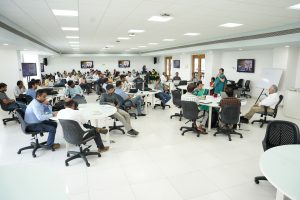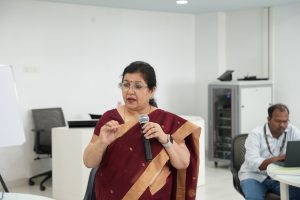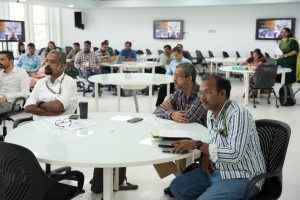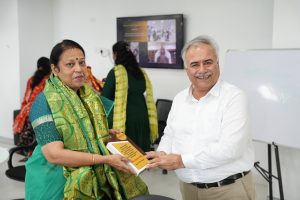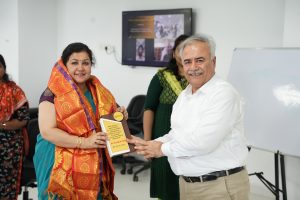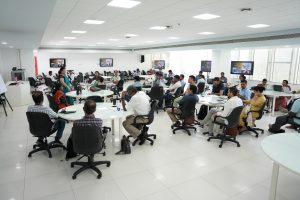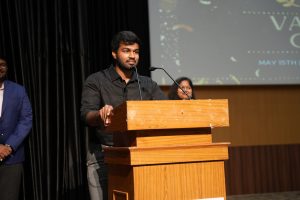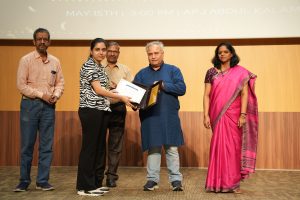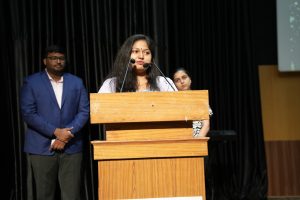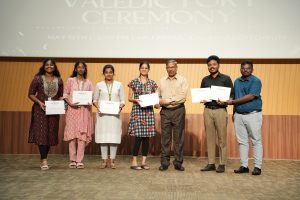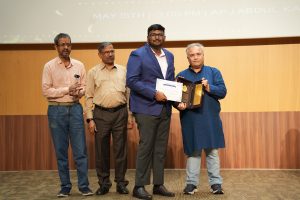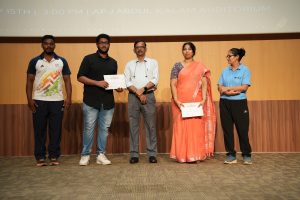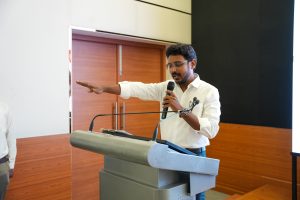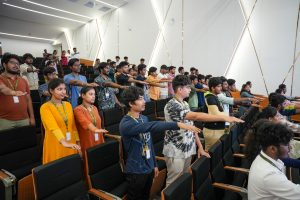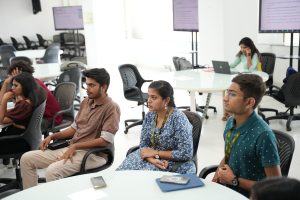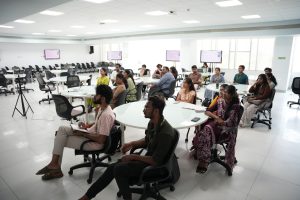SRM AP and MGIT: An Alliance Fostering Research Advancements in Drone Technology
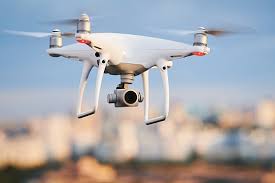
The Centre for Drone Technology, SRM University-AP, has signed an MoU with MGIT Co. Ltd, South Korea, on May 09, 2024, to facilitate research, academic, and scientific knowledge exchange in Drone technology. The agreement to spearhead research and technology developments in drone applications was signed by Dr R Premkumar, Registrar of SRM University-AP, and Mr Jeong Woo-Chul, CEO of MGIT Co. Ltd, in the presence of Mr Yun Cheol-Hun, Assistant Manager, MGIT Co. Ltd, and Dr Pranav RT Peddinti, Assistant Professor, Dept. Civil Engineering.
This collaboration signifies a major leap forward in harnessing the power of cutting-edge drone technology to address real-world challenges. The MOU facilitates the university to have experts from MGIT deliver seminars, workshops, symposia, etc., to the students and faculty of SRM AP on drone technology, its allied technologies and its applications. Undergraduate and postgraduate students and doctoral scholars of the university will also have the opportunity to be part of collaborative research projects and internships that would hugely benefit them in enhancing their awareness of drone technology.
The scope of the MOU also extends to collaboration with MGIT for national and international research funding, eligible researchers from MGIT to enrol in various courses at SRM AP, and extending the university’s academic, research and technical facilities such as laboratories, library, etc to MGIT team for research purposes.
The MOU between SRM AP and MGIT explores innovative solutions, pushes the boundaries of possibility, and revolutionises the future of drone technology.
- Published in News
SRM Foundation Establish a Free Tuition Centre at Nidamarru
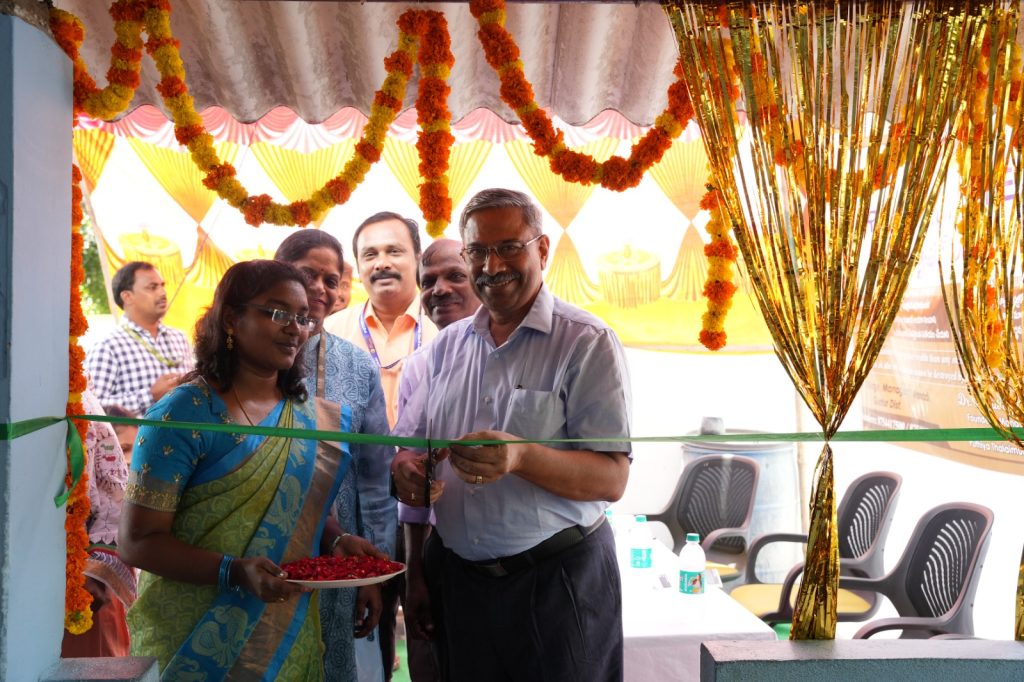
A free tuition centre was established in the Nidamarru village on Wednesday under the auspices of SRM Foundation. Dr R Premkumar, Registrar of SRM University-AP and Mrs Revathi Balakrishnan, Associate Director – Directorate of Student Affairs, jointly inaugurated the centre. Dr Premkumar addressed the students and their parents on this occasion, stating that “SRM Foundation of SRM University (Chennai), which is internationally renowned as a leading educational institution in teaching and research, is also active in social service schemes and programs in the states of Tamil Nadu and Andhra Pradesh. This tuition centre is a testament to the Foundation’s philosophy of development for the societal cause.”
The Foundation’s spokesperson, Mr Suresh Kannan, stated that the Foundation set up the first rural tuition centre to provide free education to rural students in Tamil Nadu. SRM AP Media Public Relations Manager Mr Venugopal Gangisetty further remarked that 22 tuition centres have been established in Tamil Nadu state, with 570 students being taught the curriculum. This is the first free tuition centre to be established in Andhra Pradesh.
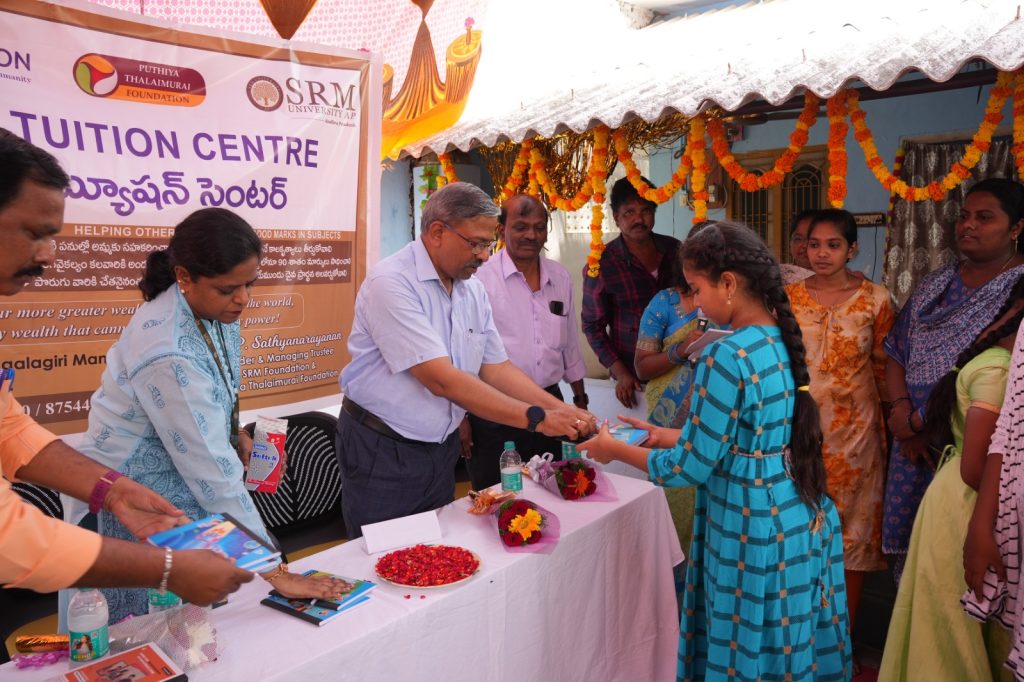
Mr Elamaran, Senior Consultant of Puthiyathalaimurai Foundation, said that students studying in sixth to tenth standard from economically backward families will be taught free of charge at the tuition centre. Many students of the villages and their parents were overjoyed as this was a remarkable hope to guarantee quality education and support for their children. Ms Prathipati Sushma, a teacher at the tuition centre, thanked SRM Foundation for setting up the first tuition centre in Nidamarru and giving her the opportunity to teach. Sweets and notebooks were distributed to the students after the program. SRM AP Chief Liaison Officer Mr Poolla Ramesh Kumar, Assistant Manager Mr Ramachandra Reddy and the residents of Nidamarru village participated in this program.
- Published in Departmental News, News, student affairs news
MOU Signed with IGCAR for Cutting-edge Biomedical Research
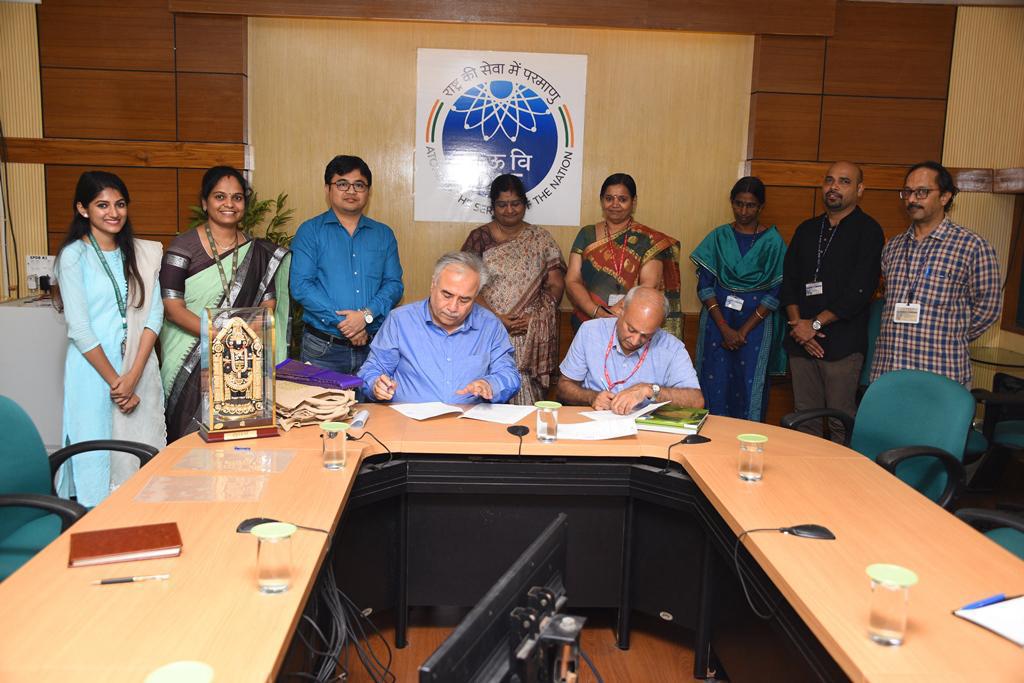
“This is a remarkable opportunity for our students to enhance their fields of study, gain academic insights from expert scientists and participate in cutting-edge research projects at IGCAR. This will ensure that we at SRM AP nurture students with a great scientific temperament,” stated Prof. Manoj K Arora, Vice Chancellor of SRM University-AP on signing the MOU with IGCAR.
SRM University-AP has signed a Memorandum of Understanding (MOU) with the Indira Gandhi Centre for Atomic Research (IGCAR) at Kalpakkam, Tamil Nadu, to collaborate on academic and research projects in Biomedical Research, Disaster Management, and other domains. The MOU was signed by Dr B Venkatraman, Director-IGCAR and Prof. Manoj K Arora, Vice Chancellor, SRM University-AP in the presence of Dr Vidya Sundarrajan, Head PHRMD & QAD, IGCAR Kalpakkam, Mrs M Menaka, Head RAMS, RESD, SQRMG, IGCAR, Kalpakkam, Prof. Ranjit Thapa, Dean-Research, SRM AP and Dr K A Sunitha, Associate Professor, SRM AP.
The MoU underscores a mutually beneficial agreement between the two institutes. On the academic front, the MOU provides internship opportunities, research collaboration for projects and industry visits for the students and faculty of SRM AP. This ensures a knowledge transfer between the two organisations, promoting stellar growth in scientific and technological advancements.
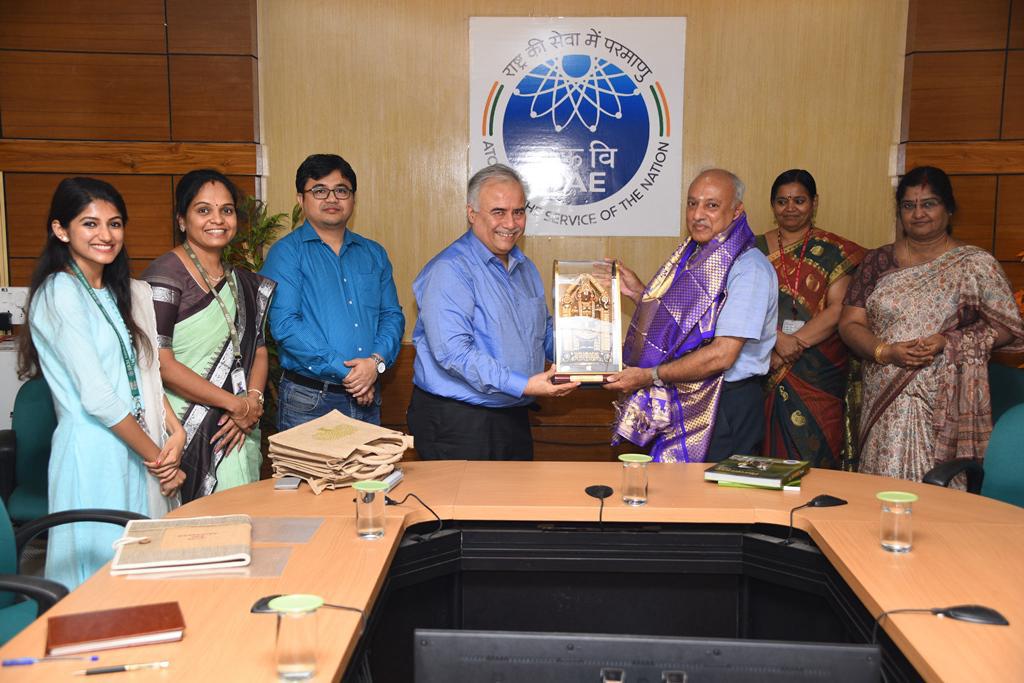
SRM AP has already collaborated with IGCAR on a consultancy project in the pioneering field of Biomedical Research last year. The parties have successfully conducted health screening of over 1500 subjects in the Chengalpattu region in Tamil Nadu, with SRM Medical Hospital & Research Centre and AIIMS Mangalagiri as secondary collaborators. Upon the successful completion of the project, IGCAR and SRM University-AP further extend their association with an official MOU for academic and research collaborations. “The MOU with SRM University-AP for translational research will be a huge motivation for the young faculty and scholars to pursue breakthrough research in their scientific domains,” remarked Dr B Venkatraman, Director-IGCAR.
Both institutes plan to extend their collaborative health screening project to the state of Andhra Pradesh, focusing on the neighbouring villages of SRM AP. Dr K A Sunitha, Project Head from SRM University-AP, opines that this project aims not just the possibility of translational research but also research for the societal cause. This research enables us to understand the correlated factors that influence various health disorders. Prof. Ranjit Thapa, Dean-Research also stated his enthusiasm for the project and expanding their research ventures to other domains.
- Published in Departmental News, News, Research News
NITTTR and SRM AP Collaborate for Trainer Programme on Outcome-Based Education
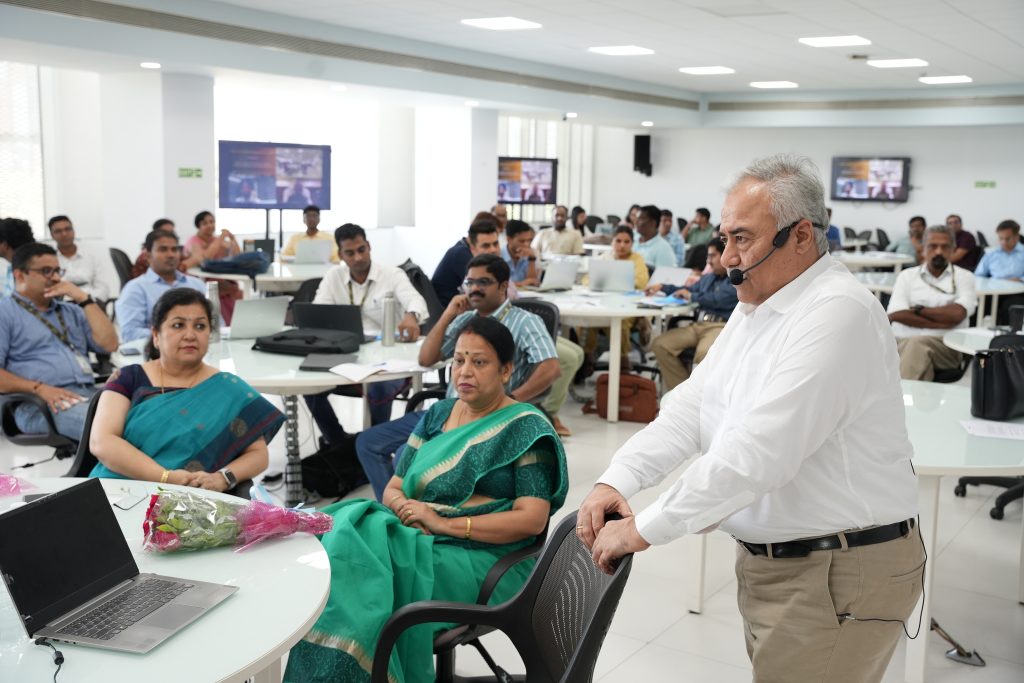
SRM University-AP organised a “Train to Trainer Programme on Outcome-Based Education (OBE)” for the faculty of the varsity to ensure a comprehensive understanding and implementation of OBE principles across all academic programmes. The five-day programme, initiated on May 20, 2024, was conducted by trainers from the National Institute of Technical Teachers’ Training Research (NITTTR), Chandigarh. The programme was inaugurated in the presence of Prof. Bhola Ram Gurjar, Director of NITTTR (joined virtually), Prof. Maitreyee Dutta, Professor and Head of Information Management and Emerging Engineering Department, NITTTR, Dr Meenakshi Sood, Associate Professor CDC, NITTTR, Prof. Manoj K Arora, Vice Chancellor, SRM University-AP, Deans of all schools, Directors and Faculty members of the institute.
The programme comprised customised training sessions and modules that covered various aspects of OBE framework design such as Implementation, Challenges, Strategies, Best Practices, Case Studies, Student Testimonials, Impact Analysis, Future Scope, etc. Trainers from NITTTR – Prof. Rama Krishna, Prof. Maitreyee Dutta, Prof. Sandeep Singh Gill, Dr Meenakshi Sood, Dr Balwindar Singh, Er Amandeep Kaur delivered the sessions.
A total of 40+ faculty members were chosen to receive training from the NITTTR Team. These faculty will be the programme-wise coordinators and master trainers, who will then train the rest of the faculty in their respective programmes and departments. This systematic training ensured that every faculty member of the university had a comprehensive and in-depth understanding of OBE and its impact on the present education system.
- Published in Departmental News, News
A New Chapter Begins: Welcoming the Vibrant Leaders of Student Council 2024-25!
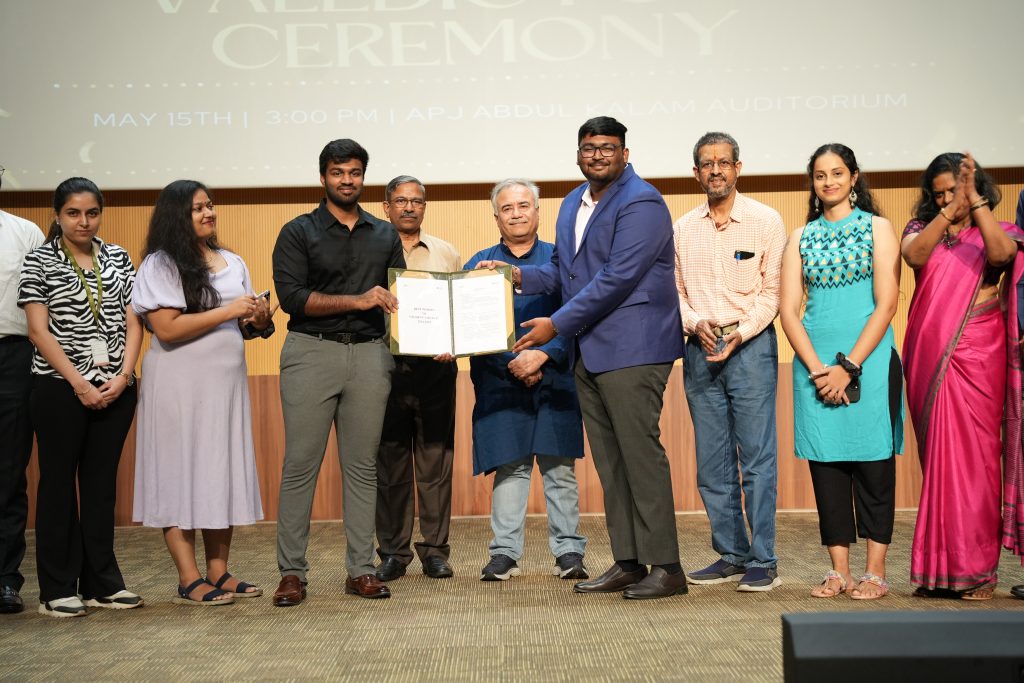
The Directorate of Student Affairs hosted a wonderful Valedictory Ceremony on May 15, 2024, marking a momentous occasion as the university bid farewell to the outgoing Student Council and welcomed the new core team.
The campus bid adieu to Preetam Vallabhaneni, Niruktha Vadlamudi, Sanjana Maini, and Laxman Bankupalle, the charismatic heads of the previous Student Council and applauded them for their phenomenal leadership. Their dedication to managing student needs, organising fests, and ensuring a vibrant campus life has set an incredible standard.
The baton has now been passed to a dynamic new team: Laxman Bankupalle, Nivedha Sriram, Ankith Reddy, and Rishabh Ranjan Ishwar, who will serve as the President, Vice President, General Secretary and Treasurer of Student Council 2024-25. The vibrant team is ready to take the reins and elevate the student experience even further. “With their remarkable capabilities, we are confident that they will continue to strengthen the bridge between the student community and university management”, stated Vice Chancellor Prof. Manoj Arora, as he welcomed the new student leaders. Associate Director-Student Affairs, Ms Revathi B exclaimed, “A new team brings in new energy, a new chapter”, as she perfectly captured the spirit of this transition.
The ceremony also recognised the outstanding contributions of all clubs, societies and committee members, SC members, NSS, CESR (Corporate Engagement and Social Responsibilities), sports teams, and volunteers. The event was graced by the presence of our esteemed Registrar, Dr R Premkumar, CFAO Ms Suma Nulu, Deans, Directors, Faculty and Students of the varsity.
- Published in Departmental News, News, student affairs news
An Inventive Navigation System for the Visually Impaired
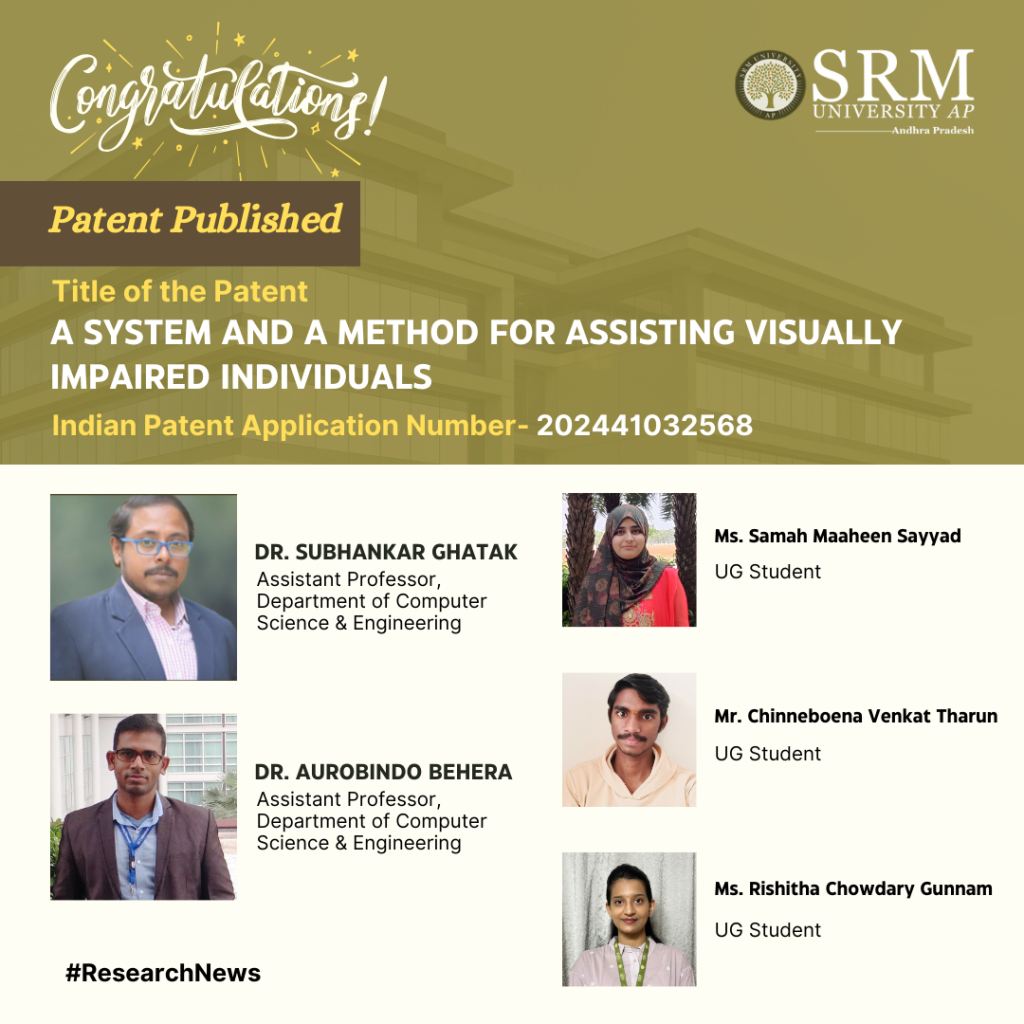
The Department of Computer Science and Engineering is proud to announce that the patent titled “A System and a Method for Assisting Visually Impaired Individuals” has been published by Dr Subhankar Ghatak and Dr Aurobindo Behera, Asst Professors, along with UG students, Mr Samah Maaheen Sayyad, Mr Chinneboena Venkat Tharun, and Ms Rishitha Chowdary Gunnam. Their patent introduces a smart solution to help visually impaired people navigate busy streets more safely. The research team uses cloud technology to turn this visual information into helpful vocal instructions that the users can hear through their mobile phones. These instructions describe things like traffic signals, crosswalks, and obstacles, making it easier for them to move around independently, making way for an inclusive society.
Abstract
This patent proposes a novel solution to ease navigation for visually impaired individuals. It integrates cloud technology, computer vision algorithms, and Deep Learning Algorithms to convert real-time visual data into vocal cues delivered through a mobile app. The system employs wearable cameras to capture visual information, processes it on the cloud, and delivers relevant auditory prompts to aid navigation, enhancing spatial awareness and safety for visually impaired users.
Practical implementation/Social implications of the research
The practical implementation of the research involves several key components.
- Developing or optimising wearable camera devices that are comfortable and subtle for visually impaired individuals. These cameras should be capable of capturing high-quality real-time visual data.
- A robust cloud infrastructure is required to process this data quickly and efficiently using advanced computer vision algorithms and deep learning algorithms.
- Design and develop a user-friendly mobile application that delivers processed visual information as vocal cues in real-time. This application should be intuitive, customisable, and accessible to visually impaired users.
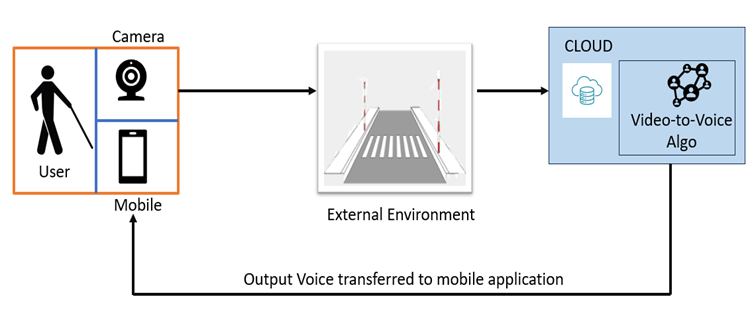
Fig.1: Schematic representation of the proposal
The social implications of implementing this research are significant. We can greatly enhance their independence and quality of life by providing visually impaired individuals with a reliable and efficient navigation aid. Navigating city environments can be challenging and hazardous for the visually impaired, leading to increased dependency and reduced mobility. The research aims to mitigate these challenges by empowering users to navigate confidently and autonomously. This fosters a more inclusive society where individuals with visual impairments can participate actively in urban mobility, employment, and social activities.
In the future, the research cohort plans to further enhance and refine technology to better serve the needs of visually impaired individuals. This includes improving the accuracy and reliability of object recognition and scene understanding algorithms to provide more detailed and contextually relevant vocal cues. Additionally, they aim to explore novel sensor technologies and integration methods to expand the capabilities of our system, such as incorporating haptic feedback for enhanced spatial awareness. Furthermore, we intend to conduct extensive user testing and feedback sessions to iteratively improve the usability and effectiveness of our solution. This user-centric approach will ensure that our technology meets the diverse needs and preferences of visually impaired users in various real-world scenarios.
Moreover, the team is committed to collaborating with stakeholders, including advocacy groups, healthcare professionals, and technology companies, to promote the adoption and dissemination of this technology on a larger scale. By fostering partnerships and engaging with the community, they can maximise the positive impact of their research on the lives of visually impaired individuals worldwide.
- Published in CSE NEWS, Departmental News, News, Research News
#NoExcusesDay: Promoting Voter Awareness and Responsibility
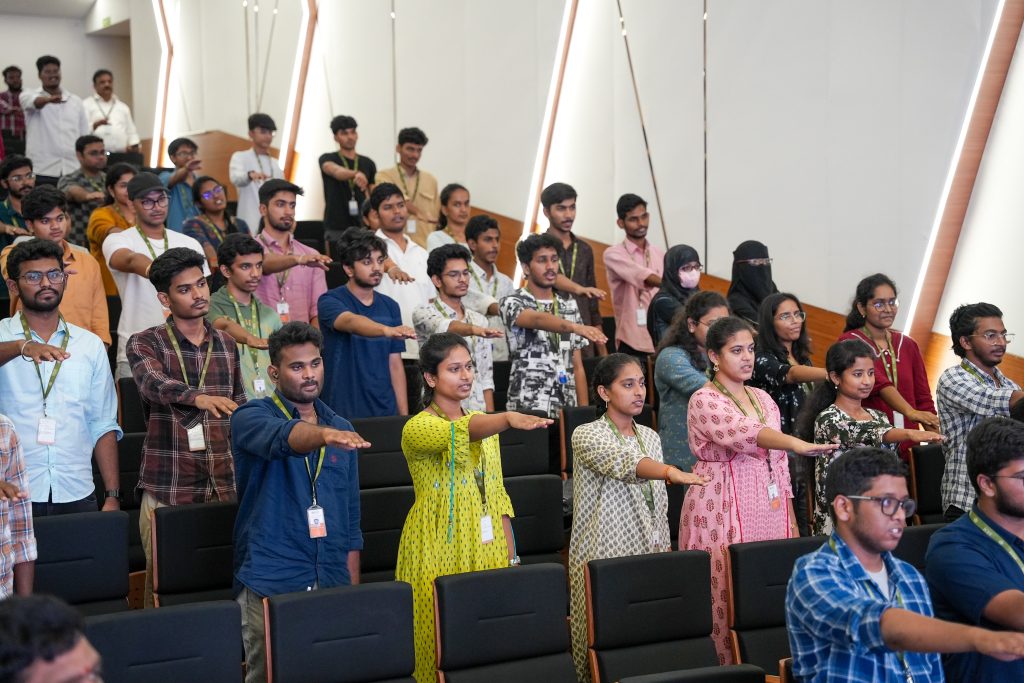
On the auspicious occasion of advocating for voter awareness and responsibility, a “#NoExcusesDay” event was held at SRM University-AP on May 09, 2024, organised by the Times of India and the Directorate of Communications of the university. The event, graced by Chief Guest, Mr Harendhira Prasad, Additional Chief Electoral Officer, aimed to emphasise the significance of voting in a democracy and to motivate citizens, especially the youth, to exercise their right to vote without fail.
The event commenced with the display of a motivating video message from President Draupadi Murmu, setting the tone for the importance of active participation in the electoral process. Highlighting the statistics of voting percentages in assembly elections from Hyderabad, the video presentation was followed by an address by Mr Rajiv Kumar, the Chief Election Commissioner, who underscored the importance of adding 97 crore voters to the electoral rolls.
The introduction of technology in the electoral process was a key point of discussion, with emphasis placed on the utilisation of advanced methods to ensure smooth and efficient polling. The staggering number of 10.5 lakh polling stations across the nation further underscored the magnitude of the electoral process.
Under the theme “Chunav Ka Parv Desh Ka Garv” (Festival of Elections, Pride of the Nation), the event witnessed active participation from students and faculty members alike. Mr Pankaj Belwariar, Director of Communications, and Mr Anil Nigam, Director of Student Affairs, graced the stage to extend their support and encouragement towards fostering a culture of voting. The event also provided a platform for students to share their first-time voting experiences. M. Kartika, Y. Ramya, V. Suma, and Tamineni Harnan Reddy shared their personal anecdotes, underscoring the sense of responsibility and empowerment that comes with casting a vote.
Mr Pankaj Belwariar’s impassioned speech resonated with the audience as he articulated the significance of treating voting as a non-negotiable duty. His “no-excuse day” message struck a chord, urging individuals to overcome obstacles and prioritise their democratic duty. Mr Anil Nigam elaborated on the disparities between rural and urban voting patterns, highlighting the heightened enthusiasm observed in rural areas. Aditya Challa, a fourth-year student, emphasised the symbiotic relationship between voting and the right to question, asserting, “No vote, no right to question.”
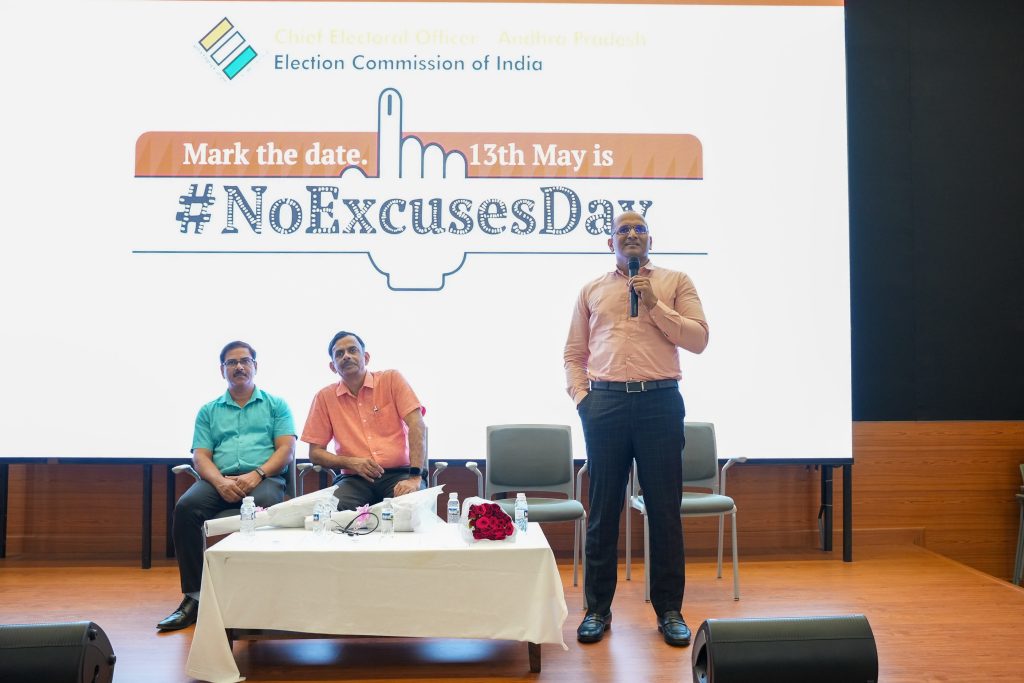
The event reached its pinnacle with the chief guest, Mr Harendhira Prasad’s speech, where the imperative nature of May 13th, termed as “D-day” for both assembly and Lok Sabha elections, was underscored. Stressing the importance of carrying approved identification cards for casting votes, the chief guest reiterated that voting is not just a right but a solemn duty that every citizen must fulfil.
The significance of the None of the Above (NOTA) option was elucidated, serving as a powerful tool for citizens to express dissent and demand accountability from political parties. The chief guest, Mr Harendhira Prasad, made a humble request for citizens to fulfil their duty with the same diligence as those involved in organising the elections, resonating deeply with the audience.
In conclusion, the event served as a poignant reminder of the privileges and responsibilities inherent in a democratic society. Through informative sessions, personal anecdotes, and impassioned speeches, attendees were galvanised to embrace their role in shaping the future of the nation through the simple yet profound act of voting. As May 13, 2024 approaches, the call to action reverberates loud and clear: no excuses, only votes.
- Published in News
Patent Granted for Research in Developing Tarnish Resistant Silver Alloys
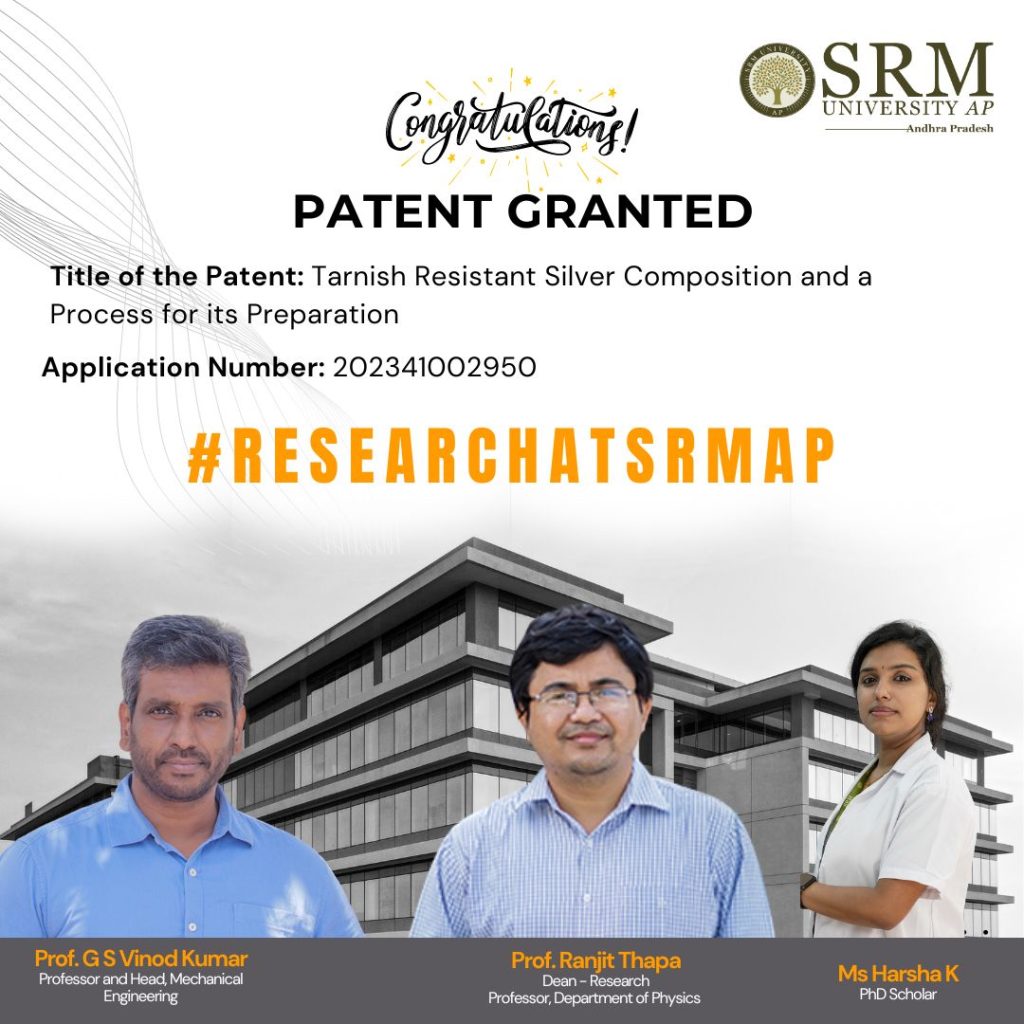
Yet another groundbreaking achievement for the researchers at SRM University-AP! Prof. Ranjit Thapa, Dean-Research and Professor, Department of Physics, Prof. G S Vinod Kumar, Professor and Head, Department of Mechanical Engineering and Ms Harsha K, PhD scholar, continue to make their mark in the university’s excellent research legacy by having their patent “Tarnish Resistant Silver Composition and a Process for its Preparation” being granted by the Indian Patent Office. This innovative research team has used density functional theory to explain the tarnishing of silver. Their work also focuses on finding alloying elements that protect silver.
Abstract
The research is on the development of tarnish-resistant silver alloys from an experimental and computational perspective. With time, silver atoms on the surface of the metal undergo sulphidation and form Ag2S molecules. These particles will accumulate to form a layer whose thickness goes beyond 10nm, and then the human eye will start to find a discolouration on the surface of silver, which is tarnish. The stain colour changes from light yellow to dark brown. This reduces the lustre of silver and makes them aesthetically non-pleasing. The silver jewellery and articles manufacturing industry suffers from this tarnishing as it leads to the loss of material and money and ruins intricate designs made of silver. The research study attempts the problem by alloying silver with appropriate elements, which are computationally checked and verified. The team works with alloying elements such as Cu, Zn, Ge, Ti, Zr, Mg, Al, and Be. Along with tarnish resistance, the proposed alloys maintain high reflectance, good hardness, and excellent workability when spinning.
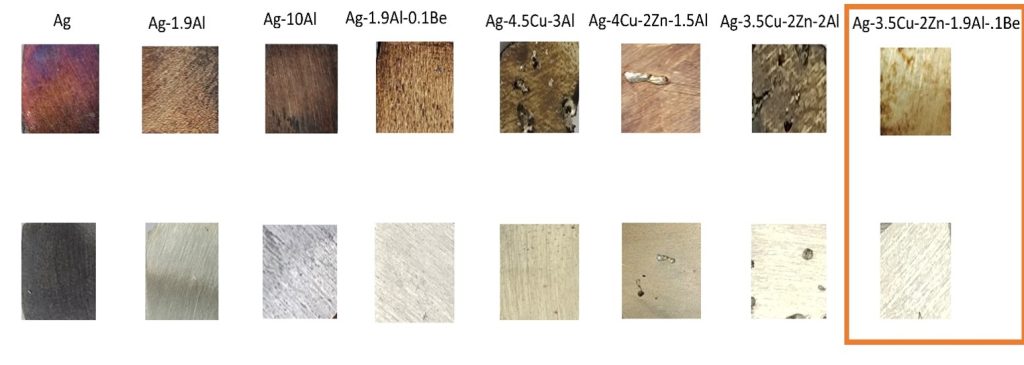
Figure.1 The images of different silver alloys after accelerated tarnish test in as-cast condition (first row) and after undergoing passivation heat treatment at 450°C for 1 hour in the presence of oxygen (second row).
Practical implementation/social implications of the research
- Stainless silver is in demand as customers want their precious metal articles to be kept for a longer time as heirlooms. So, the product that we could develop out of our composition will be making more demand for silver.
- It can increase the market potential of silver.
- It can lead to more innovations in the jewellery industry.
Collaborations
- Waman Hari Pethe
- Ashlyn Chemmannur
- TITAN
The team would continue to work on the scope of research to develop more tarnish-resistant compositions, improve the tensile strength, scratch resistance, surface hardness, and workability of silver alloys and find novel elements which can add to desirable properties of silver.
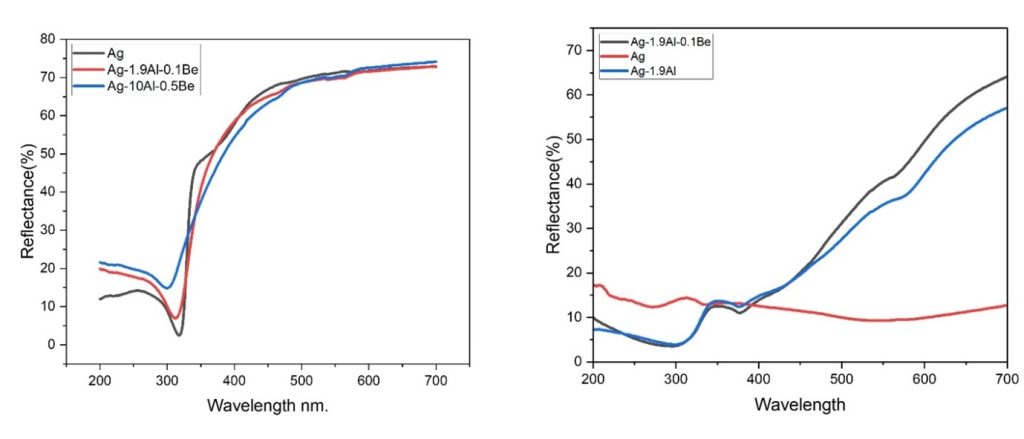
Figure.2 Reflectance of alloys (a) before tarnish test (b) after tarnish test
- Published in Departmental News, Mechanical Engineering NEWS, News, Physics News, Research News
A Review of Non-isolated BDC Topologies for Renewable Energy Systems
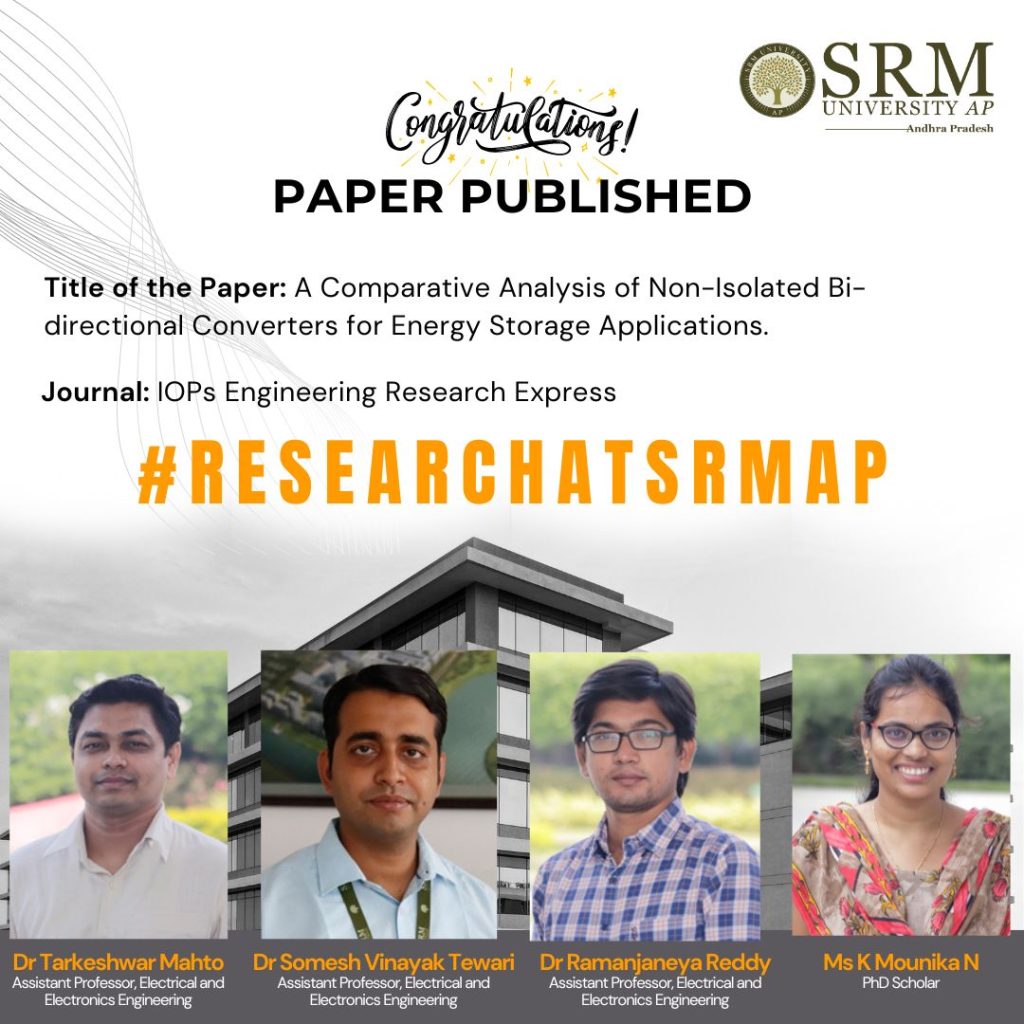
The Department of Electrical and Electronics Engineering is glad to announce that the paper titled “A Comparative Analysis of Non-Isolated Bi-directional Converters for Energy Storage Applications”, authored by Dr Tarkeshwar Mahto, Dr Somesh Vinayak Tewari, Dr Ramanjaneya Reddy, Assistant Professors and Ms K Mounika Nagabushanam, PhD Scholar has been published in the IOPs Engineering Research Express having an impact factor of 1.7. The paper explores various non-isolated bi-directional DC-DC converter topologies for renewable energy systems, providing insights into their performance and suitability for different applications.
Abstract
Bi-directional DC-DC converters (BDC) are required for power flow regulation between storage devices and DC buses in renewable energy-based distributed generation systems. The fundamental requirements of the BDC are simple structure, reduced switching components, a wide range of voltage gain, low voltage stress, high efficiency, and reduced size. There are different BDC topologies for various applications based on the requirements in the literature. Various BDCs are categorised according to their impedance networks. Isolated BDC converters are large due to high-frequency transformers and hence used for static energy storage applications whereas non-isolated BDC is lightweight and suitable for dynamic applications like electric vehicles. This paper reviews types of non-isolated BDC topologies. The performance of five non-isolated BDC converters under steady-state conditions is evaluated using theoretical analysis. On this basis, the suitability of BDC for different applications is discussed. Further advantages and limitations of converters are discussed by using comparative analysis. The optimisation of BDC for distributed generation systems from the perspectives of wide voltage gain, low electromagnetic interference, and low cost with higher efficiency is identified. Theoretical analysis of the converters is validated by simulating 200W converters in MATLAB Simulink.
The main challenges with energy storage systems are frequent failures due to frequent charging and discharging and the volume of the power converter. The team plans to:
- To design a converter with fewer components, low switching stresses, high power transfer capability, and higher efficiency to deliver continuous current to the energy storage system.
- To work on various control techniques to keep the DC link voltage of the propulsion system constant.
Link to the article
- Published in Departmental News, EEE NEWS, News, Research News
A Crash Course in Decoding Language with Ms Andalib Mahmud
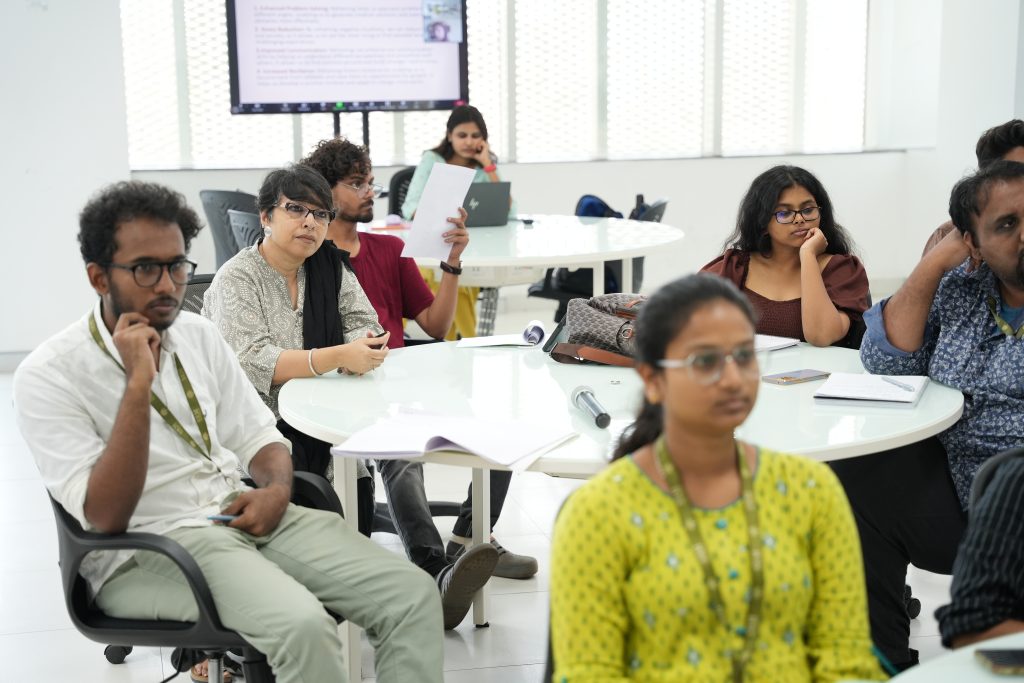
The Department of Literature and Languages invited Ms Andalib Mahmud, distinguished psychologist and master practitioner and trainer of Neuro-Linguistic Programming (NLP), to deliver an insightful guest lecture at SRM University-AP to students enrolled in the open elective course “Decoding Language,” taught by Dr Srabani Basu on May 02, 2024. Ms. Mahmud captivated the audience by elucidating the theory and practice of ‘reframing,’ a behavioural intervention technique utilised in NLP. She expounded on the intricacies of reframing, its techniques, objectives, and efficacy in modifying behaviour patterns. To enhance understanding, Ms Mahmud engaged the students in stimulating group activities, transforming the lecture into an experiential learning session.
The event not only provided students with theoretical knowledge but also offered practical insight into the application of NLP techniques. Ms Mahmud’s expertise and engaging teaching style left a lasting impression on the students, enriching their understanding of language decoding and behavioural interventions. The lecture was a resounding success, inspiring students to delve deeper into the field of NLP and its applications in language and communication.
- Published in Departmental News, English Current Happenings, News


